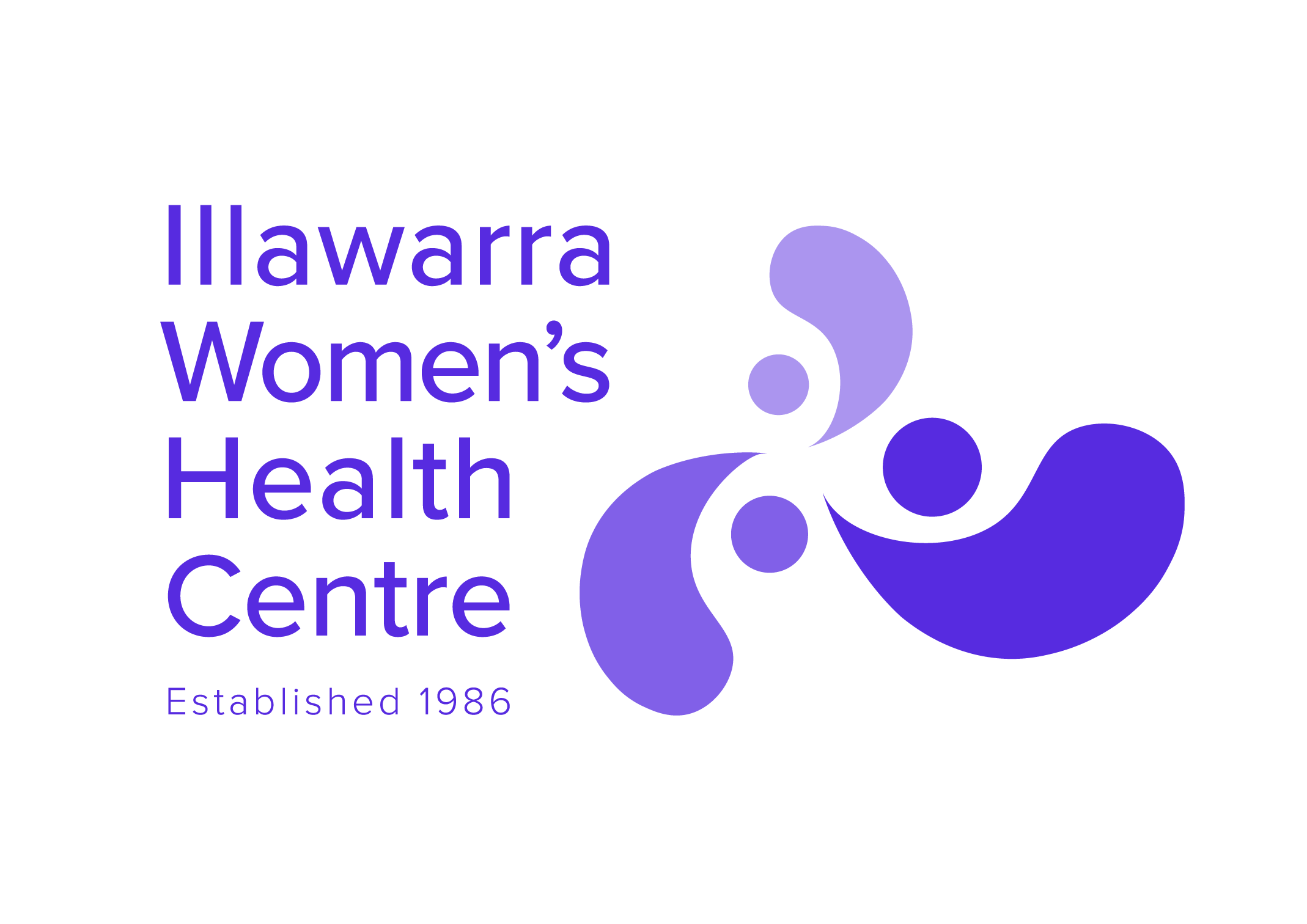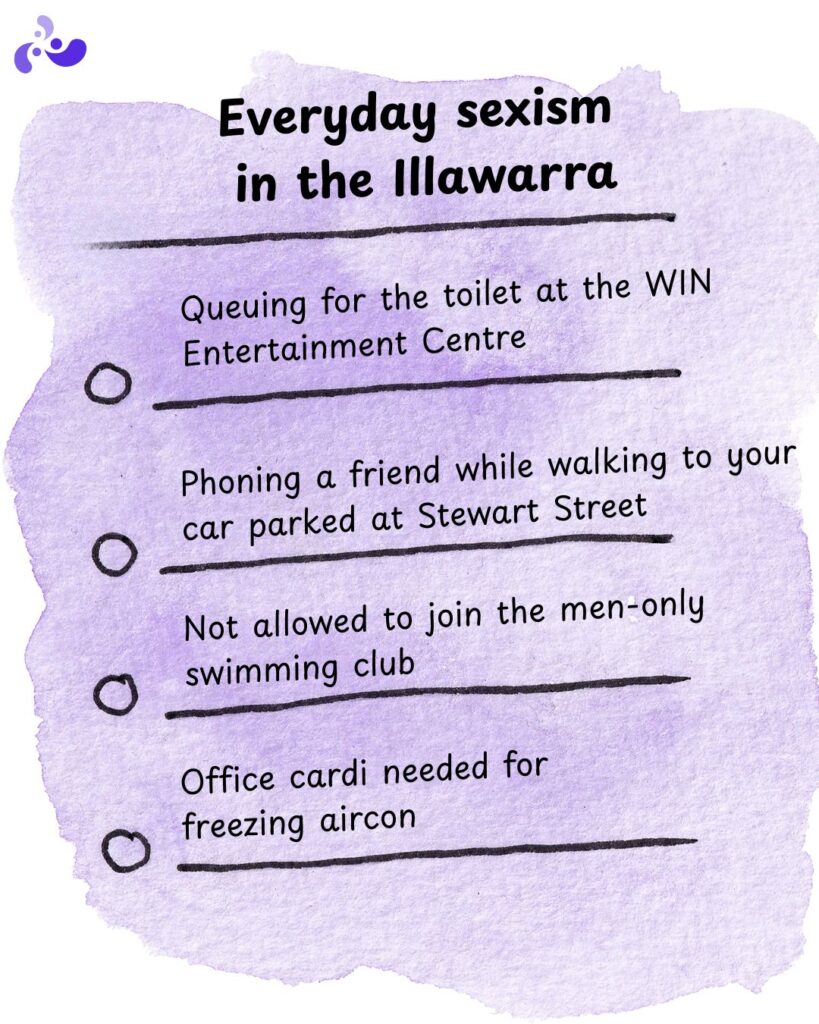Have you ever found yourself sitting through a work meeting feeling so cold from the air conditioning that you can’t think of anything else?
Or maybe you’ve attended an event at the WIN Entertainment Centre and needed the bathroom only to find a huge queue at the ladies and none at the men’s.
Maybe you’re a swimmer who would like nothing more than to join the winter swimming group, only to find it’s a men-only affair.
Or perhaps you’ve parked at Stewart Street Car Park and need to call a friend to feel safe while you return to your car after an evening out.
These are all examples of everyday sexism we experience in the Illawarra. They are not singular to the region; they are scenarios that play out worldwide, and as women, we commonly put up with it – or find a way around it.
There’s the office cardigan, which is worn only in extreme air-conditioning weather. There’s the diligent planning that goes into a bathroom break to avoid the queues, and well, with the winter swimming clubs, women have now set up their own versions of the same thing, with men also welcome.
Sexism in the Illawarra isn’t always loud. It’s not always a scandal, headline, or a hashtag. Often, it’s quieter – embedded in offhand comments, unequal opportunities, and assumptions so common they barely register.
The real estate agent might ask your male partner where they work, only turning to you when they get to the kitchen. They don’t know that you are the primary breadwinner in the relationship and never cook.
Or it might be a roomful of male suits at a business event. You’re one of 10 women and are asked if you are one of the event organisers. (You are not.)
It might be at the sidelines of Saturday morning sport when a Dad asks you to wash the shirts/organise the oranges, or manage the group chat “because women are good at that”.
Or it’s getting to a popular swimming spot and realising there are no changing rooms or toilets. “Can’t you just wee behind a bush?”
There’s even the expectation that, as a female, you join the school’s P&C committee and organise not just the Father’s Day stall but also the Mother’s Day stall, among other things.
And then there are the parts of Wollongong you avoid because they just don’t feel safe day or night. Wollongong City Council and Transport for NSW joint project Safer Cities: Her Way had women map out those spaces – which included McCabe Park, the Piccadilly Centre, and Port Kembla’s Wentworth Street.
As part of the project, the Council has installed fairy lights on the trees at McCabe Park and plans to do the same at Port Kembla.
Great measures, but do they make a lone female feel safer?
So what can you do?
1. Speak Up When You See It
When someone makes a sexist joke or comment, it’s easy to brush it off. But saying something can make a real impact.
Try this: “Hey, that comment didn’t sit right with me. Let’s keep things respectful.”
Why it matters: Calling it out helps set the tone for what’s okay and what’s not.
2. Check Your Own Biases
We all have unconscious biases – those snap judgments we make without even realising it. Taking the time to recognise them helps us make fairer decisions.
Try this: Ask yourself, “Would I think the same if this person was a different gender?”
Why it matters: Awareness is the first step to changing behaviour.
3. Amplify Women’s Voices
In meetings or conversations, women’s ideas are often overlooked or repeated by others. Be the person who amplifies their voice.
Try this: “That’s a great point [Name] made. I think we should explore that idea further.”
Why it matters: Giving credit where it’s due helps ensure diverse perspectives are heard.
4. Advocate for Fair Policies at Work
Sexism thrives where there’s no accountability. Encourage your workplace to introduce policies that prevent discrimination and promote gender equality.
Try this: Support things like diversity training, equal pay audits, and anonymous reporting channels.
Why it matters: Policies create a safer and fairer environment for everyone.
5. Use Inclusive Language
Words matter. Avoid phrases that assume gender roles, like “manpower” or “chairman.” Small changes in language can make a big difference.
Try this: Use terms like “workforce” or “chairperson” instead.
Why it matters: Inclusive language helps shift how we think about gender.
6. Support Women in Leadership
Encourage and mentor women stepping into leadership roles – representation at the top changes the culture from the inside.
Try this: Advocate for women in leadership positions and highlight their achievements.
Why it matters: Seeing women in leadership inspires others and challenges outdated norms.
7. Be an Active Bystander
If you see someone experiencing sexism, don’t just stand by – step in. You don’t have to be aggressive to make a difference.
Try this: Redirect the conversation or check in with the person afterwards.
Why it matters: Standing up for others shows that sexism won’t be tolerated.
8. Push for Transparency and Accountability
Workplaces and organisations that track gender data (like pay gaps and promotions) can spot problems and fix them.
Try this: Ask whether your organisation publishes gender equality reports.
Why it matters: Data helps identify where real change is needed.


